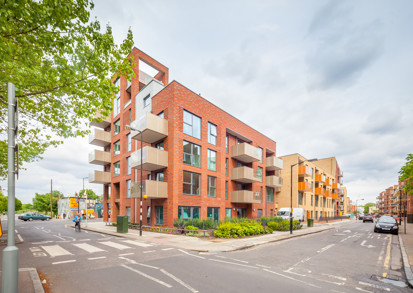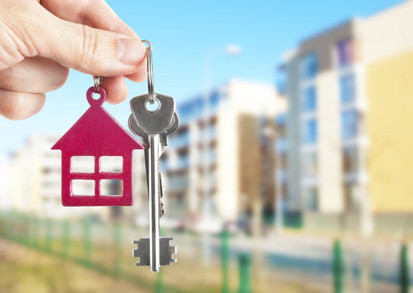What is service charge? 
A service charge is a payment made by residents to cover the cost of services and maintenance in shared buildings or estates. It can include things like cleaning, repairs, and management fees.
What are core, block and estate service charges?
Read our detailed breakdown of these different schemes.
What are leaseholders, shared ownership and freeholders?
Read our detailed breakdown of these different tenures and learn where to find your lease.
What isn't considered a service charge?
Some costs that might be confused with service charges, but are not included:
- Ground rent is paid by leaseholders to the freeholder or landlord for the land on which the building stands.
- Repairs or maintenance inside someone’s home.
- Personal utility bills which are individual to the resident, like electricity, gas, water, or broadband.
- Most of our properties are separate from communal utilities.
Services included in your service charge
- Cleaning and grounds maintenance of shared areas
- Utilities for communal maintenance
- Repairs to shared areas and facilities
View the full list of service charges that could appear on your statement.
Service charge statements explained
You should have received letters about your estimated and actual service charges. Some of you may also have a Section 20b booklet.
Learn what each part of these documents mean in more detail.
Types of service charge
There are two types of service charge - fixed and variable.

Fixed service charge
Fixed service charges are decided in advance at the start of the year and stay the same all year. There are no adjustments at the end of the year.
Variable service charge
An estimate is decided at the start of the year and charged based on your payment frequency. At the end of the financial year we will write to you to let you know if we spent more or less than the estimate.
If we spend more than estimated, we will ask you to pay the additional amount in line with your lease or tenancy agreement. If we spend less than estimated, we will refund the difference to your rent account.
Surplus and deficits
A surplus or deficit only applies to variable service charges.
- A surplus for the year happens where we spend less than estimated. In these cases we credit your rent account, which we can then refund to you.
- A deficit for the year happens where we spend more than estimated. In these cases we can charge you an additional amount to cover this difference
If you own your home through a lease or the freehold, we will issue the refund or additional charge in one amount.
If you rent your home from us, any refund you're owed or additional amount you need to pay will be spread over the following year and included in your next rent review. We call this a "prior year balance" or "PYB" charge.
Notting Hill Genesis also charges personal service charges to some tenants. These charges relate to services provided by Notting Hill Genesis to individual residences, not communal areas, and may include things like use of utilities or care-related services
Understanding your service charge
You should have received some letters from us detailing your estimated annual service charge and your actual service charge. Some of you may have also received a Section 20b booklet too. Understand what each section of these letters/booklets refers to here.
How we work out your service charge estimate
We can't predict exactly what maintenance and services will cost during the year, so we create an estimate based on the best information we have. We try to make this estimate as accurate as possible so there are fewer surprises at the end of the year.
Your local officer calculates your service charge estimate using:
- Previous years' costs - How much we spent on your building in recent years.
- Expected price changes - Whether we think costs will go up or down (for example, due to inflation or changes in contracts).
- Planned major works - Any big repair projects or improvements we expect to carry out.
- Building- specific needs - The particular services and maintenance your building requires, including any new requirements from changes in legislation (such as fire door checks following the Building Safety Act).
For a list of every service we charge for, and the approach we’ve taken to setting service charge estimates for 2026-27, please see our budget rationale guide.
What decides your share
Your service charge statement shows percentage figures for your share of each cost. This share is called your "apportionment" and depends on:
- The size of your home – Larger properties usually pay more because residents are likely to use shared services more.
- What's written in your lease or tenancy agreement – This sets out the rules for your property.
- Your fair share of services – Based on how much you're likely to benefit from each service, regardless of whether you rent or own.

How we calculate fair shares
If your share is based on a fair proportion, we follow professional guidance from RICS (Royal Institution of Chartered Surveyors) to make sure the calculation is done properly.
If you' re a homeowner, you can find details about how your share is worked out in your lease. Look for the section called 'Specified Proportion' in the Particulars section.
We will contact you three times each year about your service charges:
- To ask for your feedback - We send you our initial budget estimates and welcome your comments before we finalise the amounts
- To tell you the final amounts - We send you the confirmed service charge budget for the year ahead
- To show you what we actually spent - We send you a statement showing the real costs compared to our estimates
If we cannot send you the final statement within six months of the year ending, we will write to let you know the accounts are delayed. This is called a "section 20b notice" because of the law that requires us to inform you.
This letter puts you on notice that final costs will be due once the accounts are ready. By law, we can only ask for additional money within 18 months of when costs actually happened, so this notice gives you certainty about what costs may be charged
We might delay accounts because we're still waiting for final invoices from contractors or suppliers, or because some costs haven't been finalised yet.
We typically send you the estimate in a booklet in late February or early March. Before this, we consult on our proposed estimates to give you a chance to provide feedback and input. Your property management officer, estate operations manager or housing officer will use all available information, including your feedback, to make the estimate as close to the actual costs as possible.
Request invoice
If you would like to request an invoice, please do so via MyAccount.
If you believe there's a mistake with your service charge, you have the right to challenge it. However, there are time limits for raising disputes, so it's important to contact us as soon as possible if you have concerns.
Time limits for challenging charges
- You must raise disputes within six years - We cannot investigate charges that were billed more than six years ago
- Don't delay your payments - If a dispute lasts longer than three months, we can still collect the money while the dispute continues. This ensures we have cash flow to carry out essential services for all residents. Paying while disputing doesn't mean you're agreeing to the charge - if we find you were charged incorrectly, we'll refund any overpayment
If you're still not satisfied after speaking to your local officer to try and resolve your query and going through our complaints procedure, you can ask an independent tribunal to settle the dispute.
Free advice and support:
- Leasehold Advisory Service - Provides free advice to leaseholders about service charge disputes
- First Tier Tribunal - An independent service that can make legally binding decisions about service charge disputes
You can apply to the First Tier Tribunal if you're a landlord, tenant, freeholder, leaseholder, park home occupier or site owner paying a variable service charge.
Find out more about the First Tier Tribunal process on the government's website.





